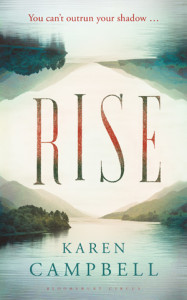 RISE
RISE
Karen Campbell
Bloomsbury Circus, May 2015, RRP $32.99
Rise is a small piece in the history of Scotland’s many and various failed nationalist efforts since 1707. Having concluded that rosy-cheeked young pretenders make poor generals, and that kilts and chest-thumping are best left to post-football pub brawls (or race riots), the modern independence-minded Scot has turned to the plebiscite as a method of experimentation*. Those of you familiar with Scottish history will probably see that this step is a bit dull, but for the best.
Despite misgivings about the author’s surname “Campbell”**, but moreso about the unlikelihood that I would enjoy this book, since I don’t generally enjoy contemporary fiction, I decided to give Rise a go. More interested in the political themes than the plot itself, I’m glad I did. However, though it is well-written and genuinely gripping, I was sadly correct in my initial assumption that the novel was not for me.
The story starts with Justine, representative of the Irvine Welsh-like societal fringe, who flees Glagow with several thousand pounds and the very real threat of violence in her near future. Taking off into the highland town of Oban, she gets off her bus early and finds herself in the rural village of Kilmacarra. The village is notable for very little except its natural beauty and the opposition of locals to windfarms. In its populace, Campbell takes the opportunity to warmly poke fun at Scottish rural stereotypes. It turns out that the red-nosed fellow in the kilt is actually from Yorkshire, for example. Kilmacarra forms a cross-point as Scotland’s past and future collide.
Kilmacarra is also home to the miserable and (literally) haunted former priest Michael. Unhappy in his marriage and worried about his sons, his faith, and his future, Michael’s chapters were a little irritating to me. I was not overly fond of his calm approach to hallucinating a literal ghost, the presence of which I found trite and annoying. Despite my own interest in spirituality and theology, his wrestling with his faith also failed to interest me.
Inevitably, Michael and Justine’s stories run together after a brutal accident. Elaborate web of relationships throw up emotional twists and turns, and the various political goings on impact deeply as well. The themes and plot complement each other well, and it is always a delight to read a book written in a proper Scottish English***. My tendency toward mimicry has me writing this review with a Scottish lilt that will likely not translate into text, but you never know.
As I have already confessed, the contemporary fiction genre is not for me. Whilst I appreciate the merits of the writing, and did try to become involved in the plot, this is not my type of story. I apologise. Fans of Anne Tyler and similar writers will likely get far more out of this book than I could.
*I mean this all with the greatest of affection to the motherland, of course. Except for the bit about race riots. That’s not cool.
**More out of obligation than genuine feelings, but they did apparently kill a lot of my ancestors and their relations. And they totally started it.
***But not Scots English, which is more interesting, but somewhat more difficult, to read.

